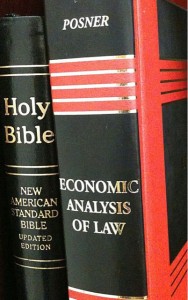
Higher law was a foundational idea in the development of the Western Legal Tradition. Higher law is the idea that there was a law above the law.
This law above the law was, of course, God’s Law. Every creature was expected to be subject to the Creator God’s demands and dictates. The importance of Biblical law, in this sense, was a given. No one doubted it. No one disputed it.
Thus, it could be said that the dominant legal philosophy or jurisprudence was higher law, or natural law as that term was understood before the Enlightenment. (For instance, Johannes Althusius (1557-1638) defined natural law as “the will of God for men.”[1] That is a definition of natural law that I can probably live with.)
Now, the dominant jurisprudence in America is quite different. And, most Americans don’t even know what it is. It is most often called law and economics.
In the preface to his immensely popular and influential “textbook-treatise” on law and economics entitled Economic Analysis of Law, Judge Richard A. Posner asserts that law and economics “is the foremost interdisciplinary field of legal studies.”[2] In support of this statement, he writes:
The former dean of the Yale Law School, a critic of the law and economics movement, nevertheless has called it “an enormous enlivening force in American legal thought” and says that it “continues and remains the single most influential jurisprudential school in this country.” More recently we read that “there is no dispute that law and economics has long been, and continues to be, the dominant theoretical paradigm for understanding and assessing law and policy.”[3]
In my experience, I would have to conclude that Posner’s assessment of the importance of law and economics as a system of jurisprudential thought is correct.
Perhaps law and economics is so popular in post-Christian, post-modern America because it doesn’t require that we all agree on any set of presuppositions. We don’t have to believe in a common meta-narrative that explains everything. We don’t need transcendent and absolute truths. All we need is to be able to agree that efficiency and societal wealth maximization are good things. Then, we just make that our definition of justice.
That’s right, justice in America is no longer being defined by the transcendent higher law of the Triune God. Rather, justice is being reduced to and recast as a question of societal wealth maximization and economic efficiency.
Maybe we shouldn’t be all that surprised. America’s headlong dash toward becoming a post-Christian nation has been well-documented by many journalists and cultural commentators. In our post-Christian post-modern culture where any idea of transcendent, absolute truths has been abandoned, perhaps the only value structure left to us is economics—the quest to get the limited resources of society into the hands of those who value them most (measured, according to law and economics, by their willingness and ability to pay for them.)
Every Christian should be concerned about the fact that this movement has come to dominate American jurisprudence. Why? Because law and economics is not only amoral, but actually stems from a worldview that is openly hostile to Christianity and any understanding of higher law.
As Kenneth G. Elzinga, a professor of economics at the University of Virginia, has so eloquently pointed out, “[i]f one starts with the presupposition that law is nothing more than ‘the amoral scene of Darwinian struggle,’ then the One who gave higher laws to Moses on Mount Sinai is not going to be a player in legal discourse.”[4] Law and economics endeavors to explain and understand all of law from a worldview that does not require and indeed has no use for the Triune God. That should trouble every follower of the Lord Jesus Christ.
Much more can be said about law and economics, and I will probably discuss it several times in coming posts. However, I want to pause today to consider this question: do we as the church of Jesus Christ have an answer?
Richard Posner has worked and still is working tirelessly to understand and shape the law according to his philosophical economic worldview. He and his colleagues have had enormous success in this endeavor.
Do we have an alternative to offer to understanding the law this way? Do we have a comprehensive worldview that could help us to understand and shape the law?
We used to. In the past, we looked to the Bible—and, I should hasten to add, the whole Bible. Christians used to look to both the Older and the New Testament to find the rules for all of life, including the law. Christians used to consider Biblical Law to be a fine model for the laws of all nations.
Now, the church has largely abandoned this view. And, with the wholesale abandonment of this view, has come a corresponding lack of consistent witness to what the law should be. The lack of consistent witness has ultimately led to a lack of influence.
Thus, we are faced with a question that must be answered in our time: what will be the foundation for a truly Christian understanding of the law? Will we return to God’s Word as the standard? If not God’s Word, then what will it be? Do we have an answer?
[1] John Witte, Jr., The Reformation of Rights: Law, Religion and Human Rights in Early Modern Calvinism
[2] Richard A. Posner, Economic Analysis of Law xxi (7th ed. 2007).
[3] Id. (footnotes omitted) (citing and quoting Anthony T. Kronman, Remarks at the Second Driker Forum for Excellence in the Law, 42 Wayne L. Rev. 115, 144 and 160 (1995) and Jon Hanson and David Yosifson, The Situation: An Introduction to the Situational Character, Critical Realism, Power Economics, and Deep Capture, 152 U. Pa. L. Rev. 129, 142 (2003)).
[4] Kenneth G. Elzinga, Law and Economics: Is There a Higher Law?, 36 Pepp. L. Rev. 507, 513 (2009) (quoting Richard A. Posner, The Problems of Jurisprudence 235 (1990)).